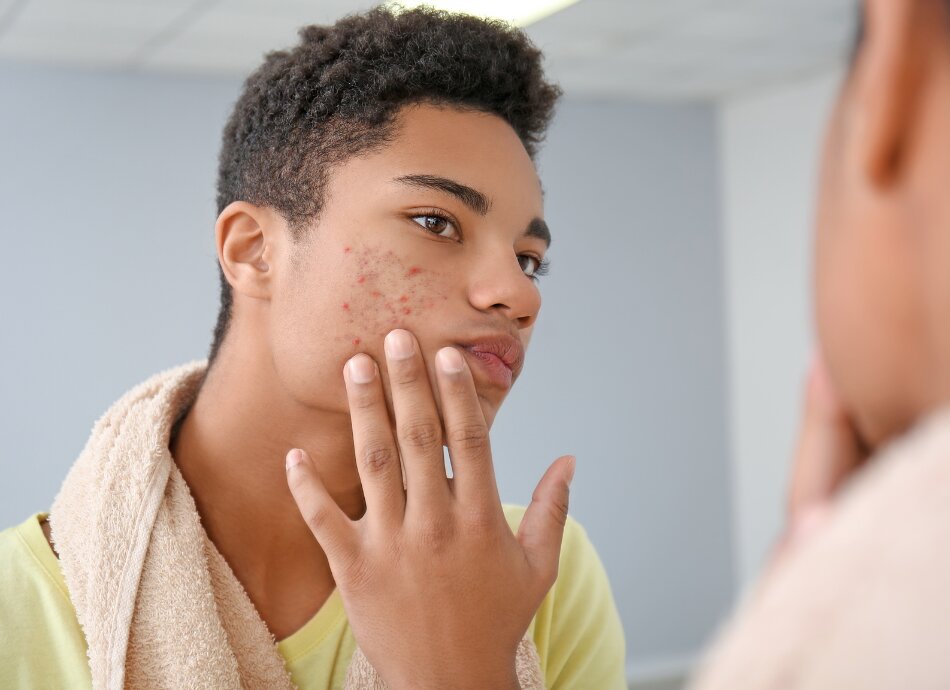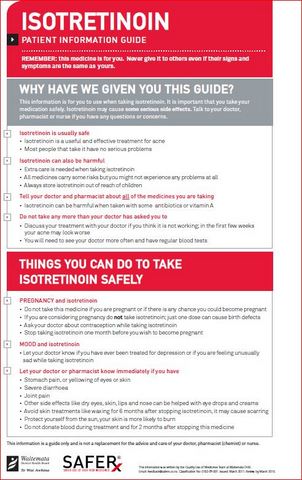Dry skin, lips, nostrils and eyes
Because isotretinoin reduces oil production in the skin, it can cause dry skin, dry mouth, chapped lips, dry nostrils and dry eyes. These effects can be uncomfortable. Here are some tips to manage them, but if you have any questions, ask your doctor or pharmacist for advice.
- Lips: From the start of treatment, use an emollient lip balm that has a sunscreen. It's important to apply the lip balm often during the day, such as in the morning as soon as you wake up, after any food, snack or drink, last thing at night and any other time in between that your lips become dry.
- Skin: From the start of treatment, use a non-perfumed moisturizing cream. Use non-soap cleansers, as these are less likely to irritate the skin, compared with a soap cleanser. Avoid beauty treatments such as chemical peels, dermabrasion and waxing during treatment and for at least 6 months after stopping.
- Eyes: Your eyes may become dry and itchy, especially if you wear contact lenses. Ask your pharmacist to recommend a suitable eye lubricant (also called artificial tears). Read more about eye lubricants. While you're taking isotretinoin, you may need to wear glasses instead of contact lenses.
- Nostrils: The inside of the nostrils may become dry and crusted and lead to mild nose bleeds. Applying a thin layer of petroleum jelly gently to the inside of your nose may help.
Increased sensitivity to the sun
Isotretinoin can make you more sensitive to the sun and your skin is more likely to burn.
- Avoid unnecessary sun exposure.
- When you're outside, protect your skin by using an oil-free sunscreen (SPF50+). Apply the sunscreen to all areas especially the face, neck and ears. Read more about using sunscreen.
- Wear clothing that protects you from the sun.
- Wear sunglasses when outdoors.
Avoid waxing for hair removal
Waxing can cause permanent scars in people taking isotretinoin. To avoid scarring, you mustn't wax while taking isotretinoin and for 6 months after you stop taking isotretinoin. This applies to hot wax and cold wax.
Changes in mood and behaviour
There have been reports of depression, low mood and behaviour changes from some people taking isotretinoin, although it hasn't been confirmed that isotretinoin was the cause. Special care is needed if you have a history of depression. Contact your doctor immediately if you experience any changes in your mood, become withdrawn, have distressing thoughts, or feelings about suicide or harming yourself, or you're feeling sad, anxious, worthless or hopeless.
Night vision may be affected
Night vision may be affected by isotretinoin. Good night vision is important for airline pilots and those flying after dark. Pilots taking isotretinoin or considering a course of isotretinoin must report to their national aviation authority to discuss how this treatment affects their flying privileges.
In Aotearoa New Zealand, this is the Civil Aviation Authority of New Zealand(external link) (CAA). Civil aviation licence holders, including Air Traffic Controllers, need to tell the CAA they are taking isotretinoin as this may affect flight safety. CAA considers the use of isotretinoin to be a change in medical condition.
Taking other medicines
Isotretinoin interacts with a few medicines such as some antibiotics and vitamin A products, including multivitamins. Check with your healthcare provider before taking any other medicines or supplements.
Breastfeeding
Don't take isotretinoin if you're breastfeeding.
Donating blood
Donating blood isn't allowed during treatment with isotretinoin, and for 4 weeks after treatment has finished. This is in case the blood is used for a pregnant woman.









